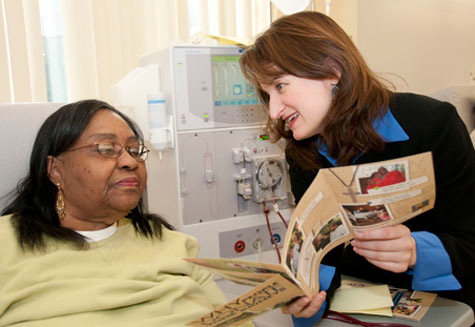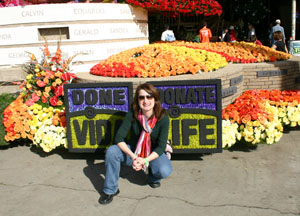
Robert Boston
Amy Waterman, Ph.D. (right), discusses kidney transplantation with patient Quindolyn Tucker. “There’s a feeling I have about what I do — that this matters,” Waterman says. “I’m very lucky to live in the center of what’s possible in this field. Every day, I get to do a job I love.”
Amy Waterman, Ph.D., is tackling a vexing health problem. There are not enough kidneys for transplants, but patients with kidney failure who choose transplants over dialysis have longer, healthier lives.
Waterman, assistant professor of medicine, researches how to help patients with kidney failure make informed decisions about transplants and how to increase the number of living kidney donors in the United States.
Daniel Brennan, M.D., professor of medicine and medical director of the Renal Transplantation Service, says Waterman’s focus is unique: “She is one of only a handful of people in the country and maybe even the world who is doing research in the psychosocial aspects of kidney transplantation.”
Barry Hong, Ph.D., professor of psychiatry and of medicine, calls Waterman a great example of a researcher who can apply psychology to the problems of medicine.
“And she is a delight to work with; her enthusiasm is infectious,” says Hong, who has known Waterman since she was a graduate student in the 1990s on the Danforth Campus.
More than 300,000 people in the United States are on kidney dialysis. Dialysis patients retain less than 15 percent of normal kidney function, even though they spend about 10 hours a week hooked to dialysis machines.
Due to the health problems that accompany dialysis, only 35 percent of dialysis patients are alive after five years. In contrast, 70 percent to 80 percent of patients who have kidney transplants are living after five years.
In her studies of more than 1,000 renal patients, Waterman has found that they’re often so overwhelmed with details about dialysis that they’re given little information on transplantation as a treatment option.
“I realized several years ago that most patients experiencing kidney failure go on dialysis and stay on it until they die,” Waterman says. “They never learn that they could return to a more normal life with a functioning kidney transplant.”
Through her research, Waterman determined that patients who are educated about kidney transplants are more likely to pursue the surgery. As a result, she recently developed and launched an innovative program to educate 13,000 patients at dialysis centers across the Midwest, beginning with the Transplant Center at Barnes-Jewish Hospital at Washington University Medical Center.
The education program, called Explore Transplant, trains nurses and social workers at dialysis centers to first talk to patients about what is important in their lives. Some patients want to be able to watch their children grow up. Others want to continue working or be able to travel freely. The medical facts about deceased and living donation are presented against the context of what patients value. Explore Transplant includes videos and discussion guides for dialysis staff to work through with patients. At the conclusion of the education, patients make the treatment decision — dialysis or transplant — that is right for them.
Through a randomized, controlled trial, the program has been shown to significantly increase patients’ informed transplant decision-making and pursuit of transplant compared with standard transplant education provided in dialysis centers. The National Association of Transplant Professionals gave Explore Transplant the Quality of Care Award in 2009.
Waterman’s next step is applying for a grant to bring the Explore Transplant program to 60,000 more patients at dialysis centers across the nation.
Roots of a social psychologist
Waterman’s parents met at an inner-city church, where her father worked through Volunteers in Service to America and her mother was a social worker.

Her mother eventually became a special education teacher, and her father, after earning a doctorate, developed training programs for the federal government.
“Both of my parents have an extreme passion for social justice and education,” Waterman says, “and I think you could say that my apple didn’t fall far from my parents’ tree.”
After growing up in Knoxville, Tenn., Waterman chose to study psychology and English at Indiana University Bloomington. She discovered social psychology, which focuses on how people relate to each other, during her junior year abroad at the University of Kent in the United Kingdom.
“I fell in love with the discipline,” she says. She then applied to a number of graduate programs in social psychology and chose Washington University. While studying the tenets of social psychological research, she applied what she was learning at the School of Medicine by working with Hong, who was researching whether living kidney donors would make the same decision again.
Donating a kidney does not change life expectancy or increase a person’s risks of developing kidney disease, Waterman says.
The studies Hong and Waterman conducted determined that about 95 percent of living donors did not regret their decision to donate.
“They said it was so meaningful to see their mom be able to pick up their child or have their dad walk them down the aisle at their wedding,” Waterman says. “They also said it was great to see their loved one living a healthy life again.”
Mike Strube, Ph.D., professor of psychology in Arts & Sciences, says Waterman was hard-working and creative as a graduate student.
“I’m not at all surprised she’s done so well,” says Strube, who was Waterman’s doctoral adviser. “She knows how to identify and organize the resources she needs to get a project done. On top of that, she really knows how to get along with others because she has an honest compassion and concern for others. The word ‘genuine’ definitely describes Amy.”
Keys to motivating people
In addition to her compassion for others, Waterman generally is interested in motivation and decision-making.
“I think in health care, we often tell patients to hurry up and do the right thing,” she says. “My job is to really listen and understand where someone is and support them in taking small steps toward health.”
Through the years, Waterman has received funding for several randomized, controlled education trials from the National Institute of Diabetes and Digestive and Kidney Diseases and from the Health Resources and Service Administration (HRSA) Division of Transplantation.
Mary Ganikos, Ph.D., education chief of the HRSA Division of Transplantation, says Waterman has a bright future.
“She has pursued her research with the highest academic standards,” she says. “We look forward to her continued efforts to advance knowledge and practice in the field of organ donation.”
Bradley Evanoff, M.D., the Richard A. and Elizabeth Henby Sutter Professor of Occupational, Industrial, and Environmental Medicine and Waterman’s boss, says Waterman’s energy and discipline have contributed to her success.
“She is passionate about improving the lives of people with kidney disease,” says Evanoff, also head of the Division of General Medical Sciences. “Her enthusiasm has helped her build a successful and motivated research team locally and has engaged other researchers and organizations nationally.”
Waterman acknowledges it is a delicate balance to help people make informed decisions but not overly promote kidney transplant amidst a kidney shortage.
More than 83,000 people await a kidney transplant, and, of these patients, 5,000 per year die waiting, Waterman says.
“Each year, only about 12,000 people die under circumstances that make them eligible to be organ donors,” Waterman says. “The only way to possibly meet the need is through living donation.”
In addition to increasing the number of transplants, kidneys from living donors last longer, have lower rates of rejection and improve long-term health. But many patients on dialysis choose to wait for a kidney from someone who has died rather than face the discomfort and guilt of asking for a kidney from a friend or family member.
“People don’t know how to bring up this topic,” she says. “They also worry about what will happen if the answer is no. How will family dinners be after that?”
As part of the Explore Transplant program, Waterman also has developed materials that help kidney patients and their potential living donors consider the option of living donation.
Waterman knows she is fortunate to have discovered an area of research that inspires her and gives her a chance to have a national impact.
“When transplant works, it is the best of what is possible,” she says.
“Kidney patients get renewed health and a longer life. Living donors do something incredibly generous and see the direct benefits of their gift. I am grateful to be able to witness this every day and to support the process as a health-care professional. It reminds me of what is truly important.”
Fast facts about Amy Waterman
Grew up in: Knoxville, Tenn.
Education: B.A., psychology and English, Indiana University Bloomington; Ph.D., social psychology, Washington University
Interests: Member of Saint Francis Xavier College Church, memoir writing, photography and travel. She returned recently from Guatemala.